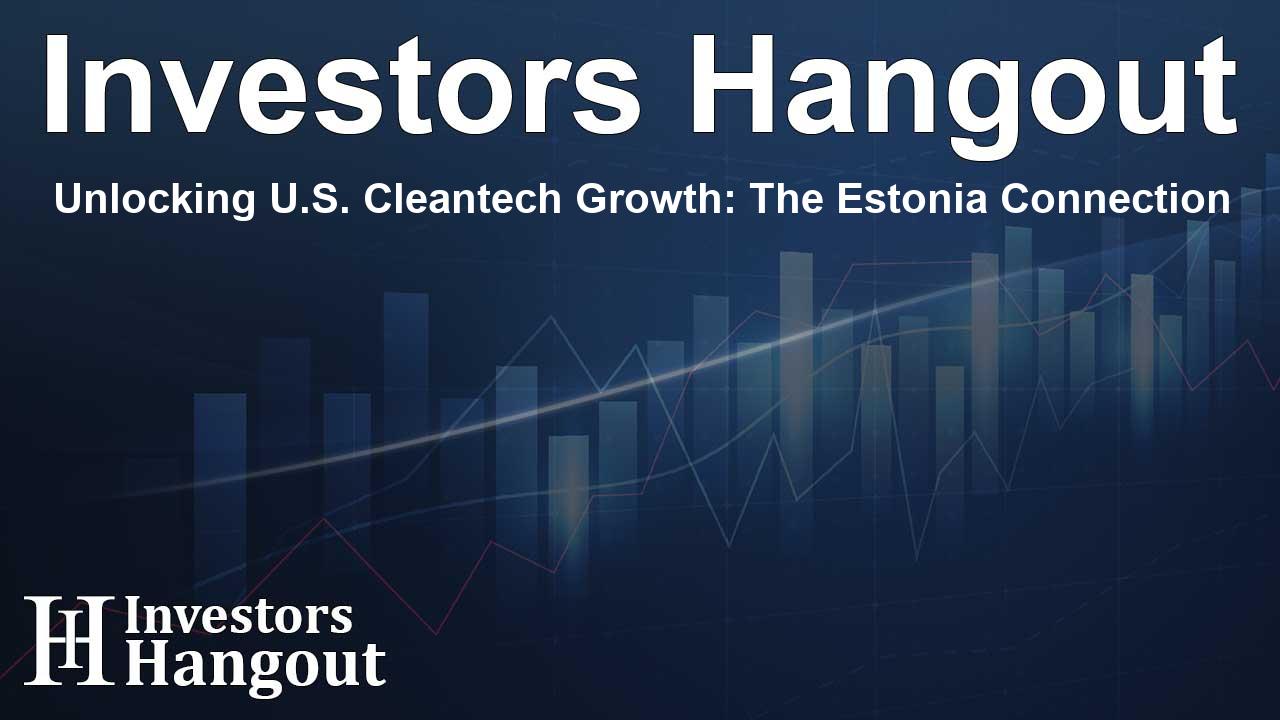Unlocking U.S. Cleantech Growth: The Estonia Connection

Barriers to Innovation in U.S. Cleantech
A recent survey conducted among over 150 U.S. cleantech executives has brought to light various challenges hindering the sector's growth. Key obstacles include a shortage of skilled professionals, funding challenges, and a lack of established best practices for innovation. As stated in the findings, the majority of respondents recognize the pressing need to import strategies and components to navigate these issues effectively.
Estonia: A Strategic Partner for U.S. Firms
Estonia appears to be emerging as a crucial ally for U.S. cleantech firms seeking to enhance innovation. With nearly half of U.S. companies sourcing critical components from international suppliers, Estonia’s strengths in energy storage, smart technologies, and digital infrastructure may prove invaluable. The CEO of the Estonian Cleantech Association highlighted that Estonia’s commitment to sustainability aligns perfectly with the needs of U.S. companies facing innovation roadblocks.
The Current Landscape of Cleantech Companies
Statistics from the survey indicate a notable trend: 67% of U.S. cleantech firms plan to boost their imports to maintain a competitive edge. Despite uncertainties in supply chains and fluctuating trade policies, over half of the companies already look to Estonian suppliers for cost-effective solutions. This collaboration can potentially accelerate both resilience and decarbonization efforts across the industry.
Key Insights from the Report
The survey revealed intriguing insights into the operational landscape of U.S. cleantech firms. For instance, 50% of these firms noted revenue growth in the past year, and an optimistic 66% expect further expansion soon. Furthermore, while government contracts play a significant role for 45% of these firms, private-sector innovation remains a pivotal driving force.
Global Supply Chains and Regulatory Challenges
The report emphasizes how global supply chain dynamics and evolving regulatory landscapes are reshaping sourcing decisions among cleantech firms. As geopolitical influences continue to shift, companies increasingly prioritize supply chain security alongside compliance with diverse regulatory environments.
Profiles of Promising Estonian Firms
Several Estonian companies are leading the charge in innovation within the cleantech sector. Firms like Skeleton Technologies, known for their energy storage capabilities, Gridraven, specializing in grid modernization, and UpCatalyst, focused on smart building technologies, embody the potential benefits of collaborating with U.S. industry players. Their focus on producing sustainable solutions solidifies Estonia's position as a formidable partner.
Conclusion: The Way Forward
The findings from this report advocate for establishing strategic international partnerships, particularly with nations like Estonia, to overcome various barriers in the U.S. cleantech sector. As the world increasingly shifts towards sustainable practices, collaboration and knowledge-sharing will be crucial in navigating future challenges and harnessing innovation.
About Estonia
Estonia stands out as a global leader in digital innovation, renowned for its pioneering e-governance and high startup density. As a progressive business hub in Northern Europe, it emphasizes transparency and efficiency, making it an attractive partner for international ventures.
About the Estonian Cleantech Association
This organization plays a vital role in connecting and promoting Estonia's sustainable companies, fostering an environment of innovation in energy, materials, and infrastructure.
Frequently Asked Questions
What are the main barriers to innovation in U.S. cleantech?
The survey identified skill shortages, funding constraints, and a lack of best practices as the primary barriers to innovation in the sector.
How is Estonia positioned as a partner for U.S. cleantech firms?
Estonia offers an advanced cleantech ecosystem, digital infrastructure, and sustainable practices, making it an ideal collaborator for U.S. companies.
What is the significance of increasing imports in cleantech?
Increasing imports allows U.S. firms to remain competitive and leverage global innovation to address local challenges.
What role do government contracts play in U.S. cleantech growth?
45% of cleantech companies rely on government contracts as a key revenue source, while private-sector innovation remains essential.
How do geopolitical factors influence cleantech sourcing decisions?
Geopolitical dynamics affect supply chain security and regulatory compliance, compelling firms to adapt their sourcing strategies accordingly.
About The Author
Contact Dylan Bailey privately here. Or send an email with ATTN: Dylan Bailey as the subject to contact@investorshangout.com.
About Investors Hangout
Investors Hangout is a leading online stock forum for financial discussion and learning, offering a wide range of free tools and resources. It draws in traders of all levels, who exchange market knowledge, investigate trading tactics, and keep an eye on industry developments in real time. Featuring financial articles, stock message boards, quotes, charts, company profiles, and live news updates. Through cooperative learning and a wealth of informational resources, it helps users from novices creating their first portfolios to experts honing their techniques. Join Investors Hangout today: https://investorshangout.com/
The content of this article is based on factual, publicly available information and does not represent legal, financial, or investment advice. Investors Hangout does not offer financial advice, and the author is not a licensed financial advisor. Consult a qualified advisor before making any financial or investment decisions based on this article. This article should not be considered advice to purchase, sell, or hold any securities or other investments. If any of the material provided here is inaccurate, please contact us for corrections.
